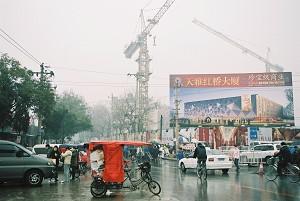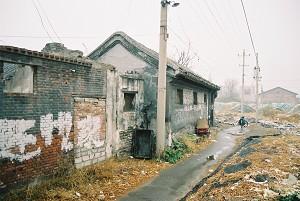In the last 10 years, prominent national scholars and experts, as well as a group of more than 100 students from a local primary school wrote to Beijing city leaders, requesting a halt to the ongoing destruction of Beijing’s historical heritage Hutong, the narrow alleyways and small courtyard houses. For them, land development was rather an issue of protecting culture. Today, it turns out to be a human rights issue for those who are forced to move out.
As the 2008 Olympic Games approach, more Hutong disappear, and are turned into high-end mansions, modern-looking business centers and shopping malls. Residents of Hutong get driven out of the homes they have lived in for generations, and have to head towards the suburbs, as the compensation offered is too little to stay nearby. Those who resist, or attempt to take legal action run the risk of harassment including visits by gangs.
Living in a hut with cracks and holes

